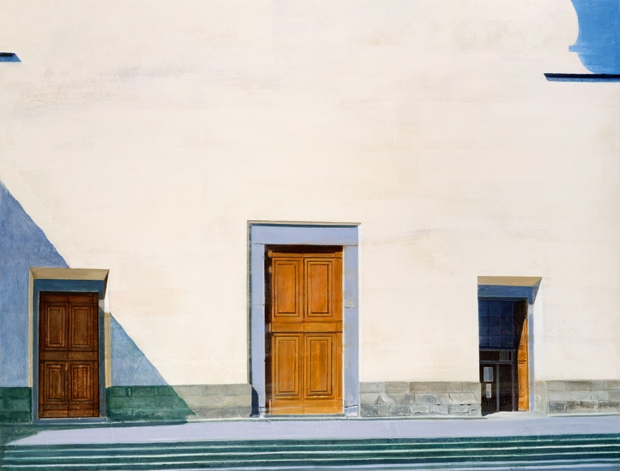One of the paintings in Arturo Di Stefano’s impressive new show at Purdy Hicks Gallery is called ‘Santa Croce’ and it depicts the arcaded cloister of the church in Florence where Giotto painted a series of frescoes. Di Stefano has not chosen to paint the obvious view — its famous black-and-white façade — but focuses instead on the cloister, where he imagines Giotto walking during the making of his frescoes. The painting is thus charged with the human presence of an artist Di Stefano much admires, a hidden presence, though real enough in the frescoed chapels behind the façade of the basilica. This is the kind of thing that Di Stefano would have been thinking about as he worked on his gloriously coloured architectural account of Santa Croce, and this is precisely what gives his paintings their emotional timbre and resonance. Although seemingly unpeopled, they are far from empty.
Di Stefano was born of Italian parents in Huddersfield in 1955, took a Foundation course at Liverpool Polytechnic, before coming to London to study Fine Art at Goldsmiths and the Royal College of Art. He has lived and worked in London ever since, apart from a year in Turin at the Accademia Albertina on an Italian government scholarship, and has exhibited extensively — at the Royal Academy, Tate St Ives, Abbot Hall in Kendal and the Museum of London, as well as a retrospective at the Walker Art Gallery in Liverpool (1993). The first book on his work was published in 2001, but his art is still not as widely known as it deserves to be. With this new show at Purdy Hicks offering a group of paintings of remarkable range and achievement, accompanied by a handsome catalogue featuring an interview between the artist and the internationally respected curator and critic Michael Peppiatt, Di Stefano has reached new heights.
The exhibition begins with a large canvas entitled ‘Santo Spirito’, the façade of another Florentine church, this time a rather minimal one, as the architect’s plans for the façade were never executed.








Comments
Join the debate for just £1 a month
Be part of the conversation with other Spectator readers by getting your first three months for £3.
UNLOCK ACCESS Just £1 a monthAlready a subscriber? Log in